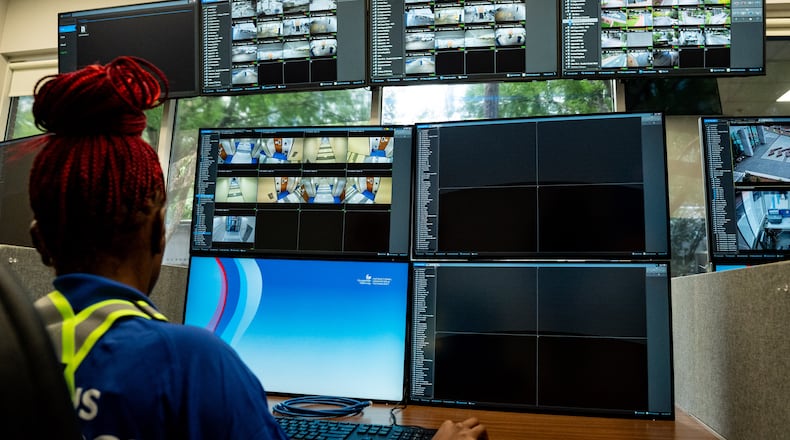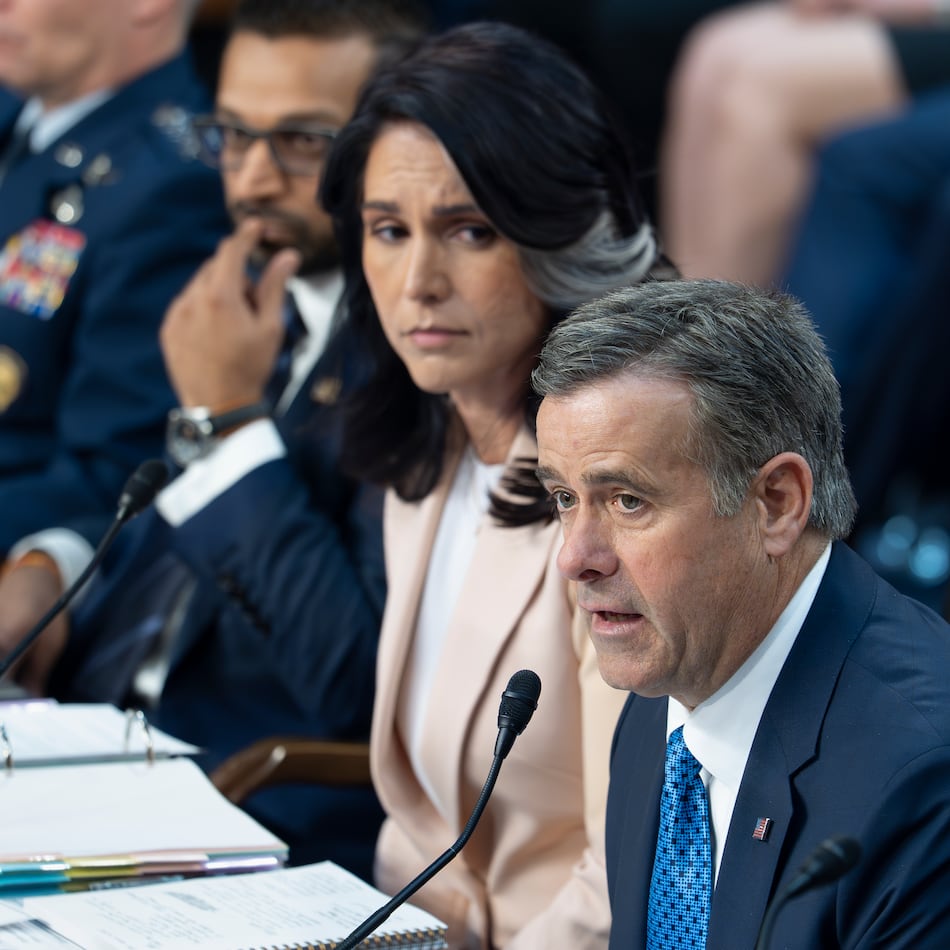A 3.7-mile marked walking path that crisscrosses Georgia State University’s downtown Atlanta campus is the latest and one of the most visible steps to make the school safer.
Welcome to the Blue Line. It’s part of about $11 million in safety and other upgrades that GSU has made for this year, largely at its downtown campus where about 37,000 of its more than 50,000 students take classes. Millions more are budgeted for improvements to some campus facilities.
A series of high-profile shootings near campus in recent years rattled students and intensified calls to strengthen security measures. Leaders of the state’s largest public university wanted the area to feel notably different, more vibrant and safer as students arrived for the fall semester.
Instead of trying to lock down a large urban campus in the middle of a major city, President M. Brian Blake’s plan is to fill it “with great energy,” friendly staff and art. And, yes, more lights and cameras too.
“We’re gonna program it in ways in which we want it to be used,” he said. “As that happens more … it just won’t be attractive for other types of behaviors to go on there.”
The test begins this semester.
Credit: Georgia State Univer
Credit: Georgia State Univer
The Blue Line aims to provide a defined walking route that connects classroom buildings, the student center and residence halls. Large signs mark the sidewalks and feature QR codes that students can scan with their phones to find an online map or call for help. The first-floor windows of buildings that line that route have been dressed up with vinyl graphics that resemble blue waves to call more attention to the pathway.
GSU has more plans to build out the Blue Line in the coming year with branded crosswalks, accent lighting and more artwork.
Credit: Seeger Gray / AJC
Credit: Seeger Gray / AJC
Credit: Seeger Gray / AJC
Credit: Seeger Gray / AJC
Student Body President James Wilson, a senior, believes the Blue Line conveys: “This isn’t just Atlanta anymore; this is Georgia State’s campus.”
He added: “It creates one centralized path to get to the place you need to go, and you can count on that path being well-lit, patrolled and you’re not going to be alone.”
GSU also has added several dozen emergency call boxes and hundreds of new security cameras and exterior lights. Neglected parking decks, where unhoused people camped, are being demolished. The university installed card readers so that only those with credentials can enter buildings at night.
Credit: Seeger Gray / AJC
Credit: Seeger Gray / AJC
The newly opened Panther Place, near the busy corner of Piedmont and John Wesley Dobbs avenues, will provide students a safe spot they can access 24/7. The space has big windows that overlook the sidewalk, meaning there’s always “eyes and ears” on the street, said L. Jared Abramson, GSU’s executive vice president and chief operating officer. A bank of monitors show live camera feeds from around campus.
The site is also home to a growing campus ambassador program, which will eventually employ 20 workers tasked with answering questions, addressing minor issues and alerting police and security teams to larger problems.
Still to be installed are more than a dozen lights enhanced with artificial intelligence technology to monitor for street activity. The university also is seeking approval from the city to close off Gilmer Street next to Hurt Park to create a pedestrian plaza by next fall.
Credit: Seeger Gray / AJC
Credit: Seeger Gray / AJC
A GSU analysis found that two times as many crimes took place along the edges of campus compared to on campus. Some of the incidents have been deadly.
In late 2022, a student was fatally shot near campus at the now closed RaceTrac gas station at 120 Piedmont Ave. Over one spring weekend in 2023, unruly crowds gathered at Courtland Street and John Wesley Dobbs Avenue, where gunfire erupted and drivers drag raced.
Last October in that same area, four people were shot, including two students who were injured. A 19-year-old woman who was not a student died.
And in late February, a 21-year-old man died following a shooting near the gas station amid a fight. Officials said no one involved in the shooting was a student. Shortly after, RaceTrac announced it would close its store.
GSU Police Chief Anthony Coleman said there has been no violence at that site since the RaceTrac closed. A new operator wants to reopen the business and has applied to the city for a license to sell alcohol. Most of the students who live nearby are not old enough to drink legally, and GSU officials are opposed to the license. A neighborhood planning group last week voted to recommend the license be denied.
An attorney representing the applicant said the new business is willing to continue talks with neighbors about safety as the licensing process continues. The business has agreed to have off-duty Atlanta police and security officers take shifts at the site, improve video surveillance and to play classical music inside and out, which some believe deters loitering and criminal activity.
Credit: Jason Getz
Credit: Jason Getz
Days before classes began, the downtown campus bustled with activity.
Families hauled boxes and laundry baskets into the 10-story Piedmont Central residence hall located across the street from the former RaceTrac site. Crews are building a new entrance off the back of that dorm so students have a safer route from their bedrooms to the adjacent dining hall.
First-year roommates Saniya Scott and Robyn Copeland walked along Piedmont Avenue as students rolled suitcases down the sidewalk that’s now rebranded as the Blue Line.
Scott said her campus tour guide and orientation leader talked about the new call boxes and services like Panther Ride On Demand. Starting this fall, GSU will expand its police escort program so students can use an app to order a van to get them safely where they need to go in the evenings. Both students said such services make them feel safe.
As students return, Atlanta Police Department spokesman John Predmore said his agency “remains vigilant in the areas surrounding the campus” and are working closely with campus police.
Atlanta City Councilman Jason Winston, whose district includes part of the downtown campus, said city and campus police departments are teaming up for joint bicycle patrols around GSU sports venues in the Summerhill neighborhood. He’d also like to install more city cameras and create safe routes for students to walk and bike around campus.
Credit: Christina Matacotta for the AJC
Credit: Christina Matacotta for the AJC
“Georgia State is taking this very seriously. So much that, you know, they have invested heavily in projects like the Blue Line and expanding the camera network and just making sure that public safety is top of mind going into this new school year,” said Winston, who has a bachelor’s and master’s degree from GSU. “We just don’t want folks to think we’re sitting by idly while some of these incidents are taking place. We’re working hard to eradicate a lot of these issues, and we’ll continue to do that.”
About the Author
Keep Reading
The Latest
Featured








